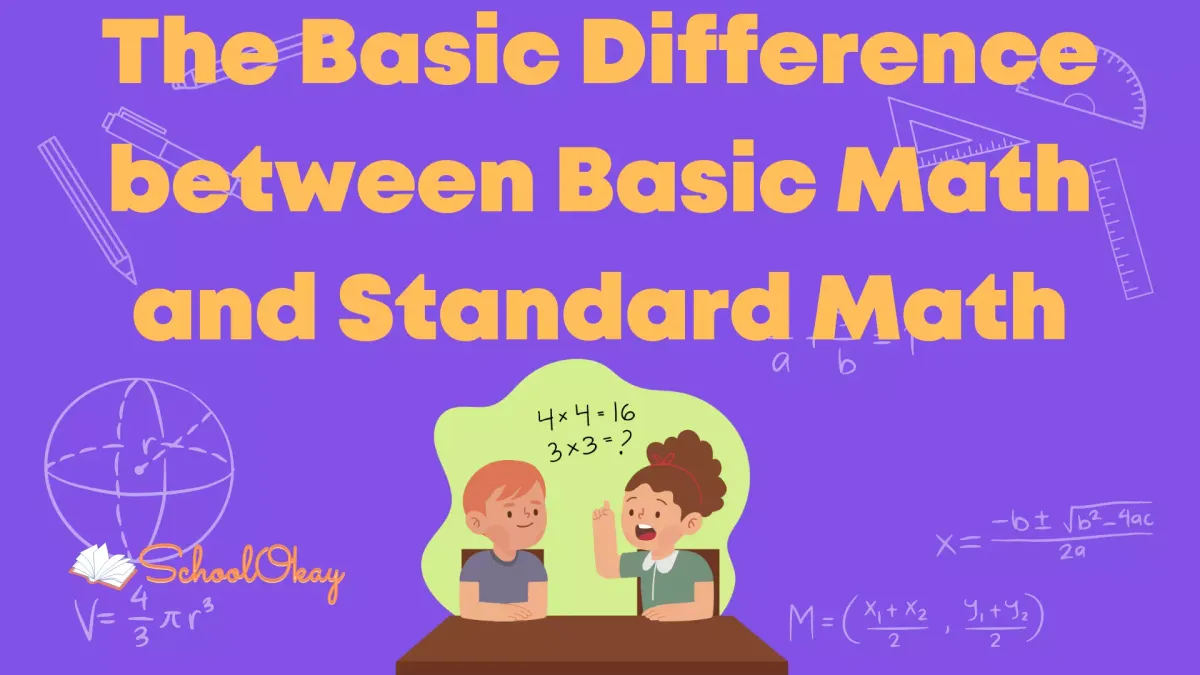The Basic Difference between Basic Math and Standard Math
The basic difference between basic math and standard math. In CBSE, two types of mathematics are offered to students of class 10th.

The basic difference between basic math and standard math. In CBSE (Central Board of Secondary Education), two types of mathematics are offered to students of class 10th. To understand this, we have to know why this has been enforced.
The motive of this distinction is that if a student wants to take commerce, arts, and medical in higher classes, then there is no need for some preparation for every student.
There is no need to worry about this if we understand their differences. Some CBSE guidelines are essential to know regarding this, which will help you gather more marks. The idea is to make evaluation more student-centric and reduce pressure on students who don't want to pursue Mathematics after class X.
Taking There are many benefits to going for standard-level mathematics. Commerce, arts or medical in school doesn't matter because mathematics is a subject that if you lack in at this age, you will realize your grave mistake.
All future endeavours require basic mathematics knowledge and applying skills like if you want to prepare for an exam, do a startup, have a good job, etc.
All MBA programs require mathematics and subjects like Accounts, Finance and Economics in higher classes. MBA entrance exams, as well as other entrance exams, are full of mathematics, and they have specific sections format reasoning and logic and logical reasoning.
The syllabus for both Standard Level mathematics and Basic Level Mathematics is the same. However, the preparation level for the standard is higher than the basic math.
The CBSE exam code for Standard Mathematics is 041, and for Basic Mathematics is 241. There are four factors into which the questions are divided into each of the two subjects. For Basic-level we have the following :
- Remembering ( 32 marks ).
- Understanding ( 28 marks).
- Applying (12 marks).
- Analyzing ( 8 patterns).
In Standard-level math, we have :
- Memory (20 marks).
- Performance (23 marks).
- Applying (19 marks).
- Analyzing (18 patterns).
As you can see, for analyzing basic mathematics, you need only eight marks; if you want, you don't have to worry about it, as you will still be scoring 72 marks. The basic-level exam is not super easy, but one thing for sure is that it will only contain easy questions from NCERT, no HOTs (Higher order thinking questions) and other complex types of questions.
Standard Mathematics
You should work through a reference book like RD Sharma and preferably an exemplar in addition to the NCERT to properly prepare for standard mathematics. You can quickly achieve a score of 75+ by completing this task two or three times.
Reviewing your incorrect answers is a fundamental necessity for getting better. To enhance time management, you can solve sample papers from Oswaal publications, notably the official sample paper from the CBSE website. Proceeding with Standard-level Mathematics means you have to go with the traditional process to level up your game.
Basic Mathematics
The theoretical portion of basic mathematics must be understood before moving on to the questions. NCERT is the only source of questions. No extra textbook will be required. Questions are frequently predicated on concepts and fundamentals, which can cause issues if you don't understand those things concerning a given chapter.
You can quickly get 80 out of 80 if you solve NCERT with examples. If you take basic level math, you can not take math in class 11th. Vary is for those students whose concepts and basics are clear.
There is not a vast difference between standard math and basic math. It all depends on your choice of subjects. The mathematics Exam is 100 marks, out of which 20 are internal assessments. These 20 marks are for
- Internal Tests (10 Marks).
- Lab Report (5 Marks).
- Activities are done in the lab (5 marks).
These 20 marks are the same for both exams. Apart from all these instructions, there are some essential things you need to remember for both exams. I have personally experienced the most significant loss in the mathematics exam is not taking the reading time seriously and navigating the question paper through pencil.
Solving takes a principal or most total amount of your time. This means you have to make choices before attempting the question paper. And if you mess up making choices, you will regret the teacher taking answer sheets from you without completing even one section efficiently.
To solve a problem, we need to identify the problem first. This is why giving first and reviewing it later is a single habit that will help you place it in different situations. Therefore, sharing one question paper every two weeks is a must for class 10th students.
The more you get comfortable giving it, the more chances you have to succeed. We are hesitant about exams, which is why we seem to avoid them. You can choose between Basic-level and Standard-level, but the preparation is not drastically different if you carefully read the blog.
People tend to cling to the more accessible part of life. Life is unfair, and you will suffer when you decide this based on what is easy. Life comes in phases.
The most common combination phase is pleasure and suffering. If you cling to hell, you will get some amount of fun. But if you do the opposite, you will get endless suffering.
Basically, What I am trying to say here is your choices decide how you're going to be in the future.
Also read:
The eleven most essential productivity books to read in 2022.
Top 10 Free Websites for NCERT Solutions.
7 Habits Of Highly Effective People
Share and subscribe to the blog by email.





